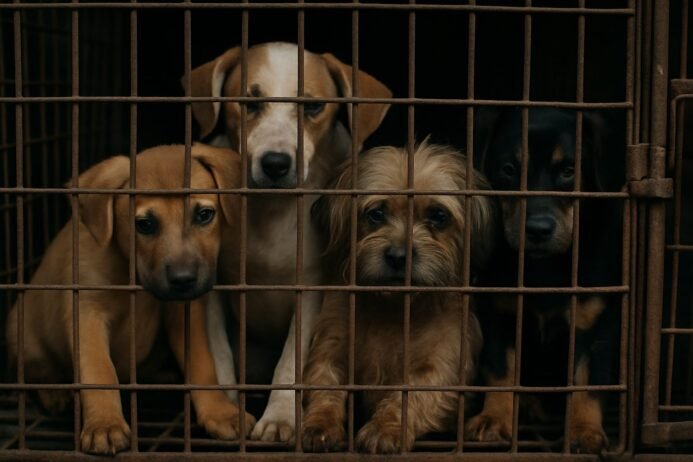Suspect Puppy Farming In the UK
- 6 December 2024
- BuyAPet Editorial Team
- BuyAPet User Articles (Support), Pet Law
UK puppy welfare guide
Suspect Puppy Farming in the UK: How to Spot the Signs & Protect Yourself
Puppy farms often operate with little regard for animal welfare. As demand for certain breeds rises, so do unethical practices. This guide explains the warning signs, welfare and cost impacts, how to find ethical breeders—and what to do if you suspect a puppy farm.
The dark side of puppy demand
Growing demand for specific breeds has fuelled puppy farming—operations that prioritise profit over welfare. Puppies from these setups are often raised in poor conditions with minimal care and socialisation.
Heartbreaking reality: the lives of farm-bred puppies
- Taken from their mothers too early—leading to distress and behavioural issues
- Higher rates of illness due to poor breeding and sanitation
- Long-term effects that can appear even after rehoming
Your role in combating puppy farming
Informed choices reduce demand for farmed puppies. Adopting, or buying only from ethical, transparent breeders, helps protect dogs and supports responsible practices.
Identifying the warning signs of puppy farms
Questionable breeding practices
- ✓ Limited transparency or reluctance to share documents
- ✓ No health guarantees or health test evidence
- ✓ Unwillingness to let you visit or meet both parents
Unhygienic conditions & poor health
- ✓ Overcrowded pens or cages
- ✓ Strong smells, visible faeces, dirty bedding
- ✓ Puppies appear sickly, fearful or underweight
Dodgy dealer tactics
- ✓ Pressure to buy quickly or send a deposit
- ✓ Promises of “rare” colours/breeds at bargain prices
- ✓ Lack of proper paperwork (microchip, vaccinations, vet checks)
The impact on puppies & society
Health problems (costs & consequences)
- Genetic disorders, infectious diseases
- Behavioural issues from poor socialisation
- Unexpected vet bills and emotional distress
Welfare implications
Trauma and neglect harm both mothers and puppies, with lifelong effects on behaviour and health.
Societal & economic burden
- Local authority and charity costs for rescue and treatment
- Shelter space taken by seized or surrendered animals
Legal & ethical context in the UK
UK laws aim to curb low-welfare breeding, but enforcement can be inconsistent and penalties may not always deter offenders. Ethical breeders, by contrast, prioritise health testing, socialisation and transparent records.
How to find a responsible breeder in the UK
Due diligence: ask before you buy
- What health checks and vaccinations have been done?
- Can I meet the puppy’s parents and see where they live?
- How have the puppies been socialised?
Visit & verify
- Inspect clean, well-kept facilities; meet mum with the litter
- Confirm microchipping, vet records and identities
- Check membership/registration where applicable
How to report suspected puppy farming
If you suspect a puppy farm:
- ✓ Report to your local authority or Trading Standards
- ✓ Contact Action Fraud if you think a crime has been committed
- ✓ Share concerns (with evidence) with recognised animal welfare organisations
Conclusion: make informed choices
By recognising red flags, demanding transparency and supporting ethical breeders, you help protect dogs and reduce demand for puppy farming. Together we can build a future where puppies are cherished—not exploited.
This page provides general information only and is not legal advice.
